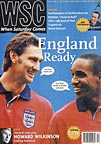 Most football fans look back at 1981 as the year Ipswich lost the title, and deserved to take it back to Suffolk. David Wangerin disagrees
Most football fans look back at 1981 as the year Ipswich lost the title, and deserved to take it back to Suffolk. David Wangerin disagrees
In the dim and increasingly distant days before the Premiership, live football on TV and the Champions League, it was a widely held assertion that small, settled squads were a desirable thing, and that a collection of a dozen or so talented, motivated and well-organised players stood as good a chance as any of winning the championship – as long as they kept their limbs and ligaments intact and their noses clean.
So it was that a squad of 14 walked off with the 1981 league title, to the chagrin of many neutrals and the bitter regret of half of East Anglia. Over time it became a sort of pox, one which supporters of Aston Villa have never been allowed to rid themselves of: the Team That Robbed The Best. We may have come top, but it was almost by default.
The myth goes like this. Because nobody could beat Ipswich, their fixture list grew unwieldy and in the end they just ran out of fuel. With steadfast England internationals, a gregarious, media-friendly manager and that intoxicating infusion of Dutch flair, they made for a far more attractive proposition than our collection of artisans judiciously oiled by a gruff, unspectacular boss. More to the point, the two teams met on three occasions that season and Ipswich won each time. Villa may have won the most and lost the least over the course of the season, but so what? Fortune had befriended us.
The concept of luck settling the championship, of the team with the most points not deserving first place, is an interesting one. Perhaps we should consider extending it to other facets of the game. Who, for example, is the “best” goalscorer? Is he necessarily the one who finds the net the most number of times? What if he is unlucky and hits the woodwork a lot, or breaks his ankle, or plays on a disproportionate number of muddy pitches or without anyone who can cross the ball? Isn’t it rather callous to judge him solely on his end-of-season output?
To explode the myth properly, it’s important to go back a further four years, to the best Villa team many have seen – one which could only finish fourth in the league, but scraped through to the League Cup final. Everton may count themselves unlucky for losing the replay, but in a sense we were unlucky too. Feelings that we were genuine championship contenders had run high – never higher than when we flattened Liverpool 5-1 before Christmas – but by season’s end we were knackered. Might the fixture list have done us in?
Four indifferent seasons later, seasons punctuated with plenty of cup-ties (42 in fact), we found ourselves none the wiser. And without a goalscorer. So, in the summer of 1980, Ron Saunders convinced Peter Withe he was all that separated us from the title, and talk suddenly resurfaced of Villa being Good Enough, provided we didn’t dip too heavily into the reserve pool, or side-track ourselves.
If you are Alex Ferguson or Arsène Wenger, a decision to concentrate on winning what needs to be won at the expense of peripheral competitions is purely an indication of your single-mindedness and determination (and, admittedly, something of a symptom of Nineties football). If, on the other hand, you are Ron Saunders 12 years before the advent of the Premier League and 16 years before the desecration of the European Cup, early exits are surely nothing more than tangible proof of your side’s limitations. But would it really be so preposterous to suggest that after either cup defeat not a single piece of dressing-room crockery was shattered in anger, that Saunders knew what he wanted and what he might need to sacrifice to get it?
In any event, it explains only part of the story. Using only 14 players? Apparently that’s down to exceedingly good fortune with injuries, not discipline, or fitness, or even an unexpectedly rich vein of collective form. It seems almost unsporting to point out that Liverpool won the next two championships with no more than 16 players, with a European Cup thrown in. That was Liverpool, this was Aston Villa.
True, the runners-up may have had more flair in their side than the champions, and more talent, and fate may even have spat on them rather a lot. Such symptoms, though, are hardly unique. The same can be said for teams devoid of serious injury or cup commitments, and yet not many of them end up in first place. The bare-faced truth of the matter seems to be that Ipswich fell apart at precisely the time championship sides come together, and Villa took the European Cup 13 months later. The rest, as Jimmy Sirrel once said, is just gossip.
From WSC 154 December 1999. What was happening this month